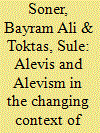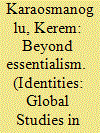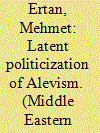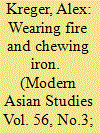|
|
|
Sort Order |
|
|
|
Items / Page
|
|
|
|
|
|
|
| Srl | Item |
| 1 |
ID:
108462


|
|
|
|
|
| Publication |
2011.
|
| Summary/Abstract |
The Justice and Development Party (JDP, Adalet ve Kalk?nma Partisi) has launched a rapprochement policy toward the Alevis. The JDP's Alevi Opening has presented a unique case in Turkey's latest identity politics not only because Alevi claims, for the first time, came to be involved in political processes for official recognition and accommodation, but also because the process was handled by a political party which is regarded to have retained Islamist roots in Sunni interpretation. This article explores the JDP's Alevi Opening process and tries to explain the motivations behind the party's decision to incorporate the Alevi question in its political agenda. What is more, the debate that the opening has caused is also under scrutiny with the positions and arguments held by the actors and the agencies involved in the process, e.g., the Alevis (the secularist and the conservative wings), the General Directorate of Religious Affairs, the National Security Council, the JDP leadership and the Islamist intellectuals.
|
|
|
|
|
|
|
|
|
|
|
|
|
|
|
|
| 2 |
ID:
123924


|
|
|
|
|
| Publication |
2013.
|
| Summary/Abstract |
In Turkey, the Alevi cultural 'revival' of the 1990s has been followed by a multifaceted identity-formation process that involves conflicting religio-cultural agendas, intersecting discourses and differing politico-ideological affiliations. Lacking a focus, this process continues to trigger an enriching public debate on Alevi identity, which has been coined an 'enigma' and is considered to be associated with 'ambiguity' and 'ambivalence' by many. What lies beneath the veil of ambiguity has to do with the 'anti-essentialist' transformation of Alevism, which reaches beyond religious, cultural and political orthodoxies. As a result of diverse political loyalties, contestation of discourses on Alevi culture and identity and the equivocal character of the Alevi subject, the Alevis seem to be resisting essentialism. In urban Turkey, an anti-essentialist discourse potentially influencing Alevism, I argue, enables the Alevi self to act with a sense of reflexivity and to search for ways to avoid political, cultural or religious orthodoxies.
|
|
|
|
|
|
|
|
|
|
|
|
|
|
|
|
| 3 |
ID:
168369


|
|
|
|
|
| Summary/Abstract |
Traditional Alevism, which was based on rural/isolated life started to dissolve as a result of urbanization in the 1960s and the 1970s. The social dynamics of Turkey associated the dissolution of archaic Alevism with political mobilization that Turkey experienced in the same period; therefore, the Alevis affiliated themselves with socialist movements in order to participate into political process more efficiently. This article analyses the affiliation between Alevis and socialist movements within the framework of the overlap between the socio-political culture of the Alevis and the political needs of the socialist movements in the 1960s and the 1970s. This affiliation might be followed in Alevi folk songs, squatter settlements, villages and the massacres that Alevis suffered in the late 1970s. Because the relation between the Alevis and socialist movements meant not the politicization of the Alevism as an independent politics of identity, but rather the politicization of Alevis through their affiliation with leftist politics, this article conceptualizes the politicization dynamism of the Alevism between 1960 and 1980 as latent politicization.
|
|
|
|
|
|
|
|
|
|
|
|
|
|
|
|
| 4 |
ID:
184162


|
|
|
|
|
| Summary/Abstract |
This article examines the practices and discourses surrounding the ikrar oaths by which some Alevis in Turkey and the Turkish diaspora are initiated into their spiritual path. I examine a contemporary revival of this Alevi oath complex, which is a historical product of the same messianic trends in post-Mongol Sufism that shaped the Mughal imperial idea of sulh-i kull, or ‘Peace with All’ religions. I argue that the ikrar oaths are paradigmatic examples of ‘post-Islam’ or Islam after the messianic suspension of its scriptural law. I show how Alevis seek to maintain their suspension of monotheism through ritual practices of animal sacrifice and music as well as the replacement of standard monotheistic oaths with post-Islamic oaths. Focusing on a recent liturgical reform movement led by the shrine of Hacı Bektaş in central Turkey, I demonstrate how the shrine works to maintain Alevis’ suspension of monotheism within the constraints of modern secularism, in part by reinterpreting secular constraints in terms of post-Islamic Alevi values, thereby highlighting elective affinities between post-Islam and secularism.
|
|
|
|
|
|
|
|
|
|
|
|
|
|
|
|
|
|
|
|
|